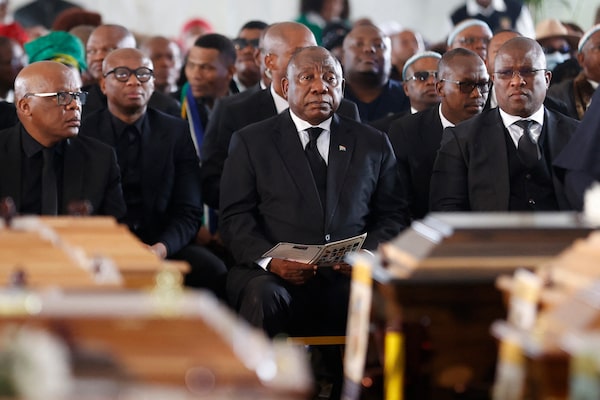
South African President Cyril Ramaphosa looks on during a symbolic mass memorial service in East London on July 6, after 21 people, mostly teens, died in unclear circumstances at a township tavern last month.PHILL MAGAKOE/AFP/Getty Images
Four years after promising a “wonderful dawn” for a country ravaged by corruption and unemployment, South African President Cyril Ramaphosa today finds himself besieged by new variants of the old scandals that toppled his disgraced predecessor.
Many South Africans were filled with hope in February, 2018, when the multimillionaire businessman gave his first speech to Parliament. “A new dawn is upon us,” he told cheering MPs, just two days after former president Jacob Zuma was forced to step down. “A wonderful dawn has arrived.”
Pundits, noticing an unusual mood of euphoria in the country, dubbed it “Ramaphoria.” Optimism briefly reigned. But instead of leading South Africa to an era of prosperity and justice, Mr. Ramaphosa has presided over the same morass of corruption allegations, economic stagnation, rising crime and lawlessness.
As he prepares to seek re-election as leader of the ruling African National Congress later this year, Mr. Ramaphosa is already facing pressure from some ANC veterans who want him to resign. Most analysts still see him as the favourite to retain the leadership, but his grip is weakening as the Zuma faction senses an opening.
Mr. Ramaphosa, a business tycoon and former union leader who helped lead the transition from apartheid in the early 1990s, has tried to attract foreign investment to bring South Africa out of its economic slump. But growth remains so marginal that disastrous rates of poverty and joblessness have persisted.
Electricity outages of up to nine hours per day are paralyzing the country’s economy this month, sparking forecasts of another recession. The rolling blackouts have reached record levels this year, at an enormous cost to industry and small business, while ordinary families are freezing in the dark in the South African winter.
Unemployment, meanwhile, has climbed to nearly 35 per cent, compared to 27 per cent when Mr. Ramaphosa took office. Consumer confidence has fallen to one of its lowest levels since the apartheid era. Railway lines and power stations are nearing collapse from sabotage, theft and neglect, while an anti-foreigner mood is sparking mob violence against migrant truckers and shopkeepers.
A growing number of South African commentators are describing their country as a “failing state” or even a “partially failed state.” The climate of lawlessness has been reinforced by rampant violence – including the shooting deaths of 21 people at three South African taverns this weekend – and the revelation that nobody has been successfully prosecuted for an estimated 200 killings during a looting spree that destroyed hundreds of shops and malls last July.
Equally damaging to Mr. Ramaphosa has been the failure of his anti-corruption campaign – and emerging new evidence that he too has contributed to the graft scandals that have engulfed the ANC government for more than a decade.
In his 2018 speech, he vowed to “turn the tide of corruption” and defeat “the era of disillusionment.” But few of the Zuma-era graft cases have been prosecuted. And now the President himself is under fire.
A four-year inquiry into state corruption, headed by Chief Justice Raymond Zondo, has concluded that Mr. Ramaphosa ignored the wrongdoing of the Zuma presidency, remaining silent and allowing it to fester for years after he became South Africa’s deputy president in 2014.
“He should have spoken out,” the inquiry concluded in a lengthy report last month. “There was surely enough credible information in the public domain … to at least prompt him to inquire and perhaps act on a number of serious allegations. As the deputy president, he surely had the responsibility to do so.”
Even as he was buffeted by the Zondo report, Mr. Ramaphosa was hit by another extraordinary allegation. A former intelligence chief, Arthur Fraser, said the President had allowed as much as US$4-million in cash to be hidden in farmhouse furniture on his cattle and wildlife ranch, and then failed to report the theft of that cash in 2020. Opponents have suggested that he could have broken laws on foreign currency, tax evasion or money-laundering.
Mr. Fraser is an ally of Mr. Zuma and faces corruption allegations of his own, so his accusations against Mr. Ramaphosa are seen as a sign of the ANC’s factional battles. But the President has confirmed that a large sum of cash was stolen from his ranch. The ANC’s integrity commission, which has the power to recommend action against him, has called him in for questioning on the matter. Police are also investigating.
Among those criticizing Mr. Ramaphosa is a prominent ANC member and anti-apartheid hero, Mavuso Msimang. Six years ago, he campaigned for Mr. Zuma’s resignation. Now he wants Mr. Ramaphosa to step down.
“As long as there is a lack of satisfaction about the answers that he has given, he really owes it to both the ANC and the country to step aside and allow this thing to be fully investigated,” Mr. Msimang told public broadcaster SABC last week.
William Gumede, a political analyst and associate professor at the University of the Witwatersrand in Johannesburg, said the farm cash allegations are the biggest political battle that Mr. Ramaphosa has faced in his presidency. “Even if Ramaphosa survives the mess, his reputation has already been tarnished,” Mr. Gumede said in a commentary last week.
Our Morning Update and Evening Update newsletters are written by Globe editors, giving you a concise summary of the day’s most important headlines. Sign up today.
 Geoffrey York
Geoffrey York